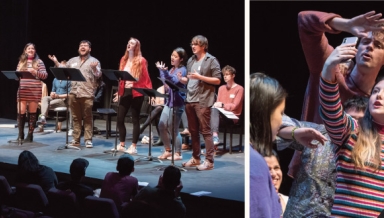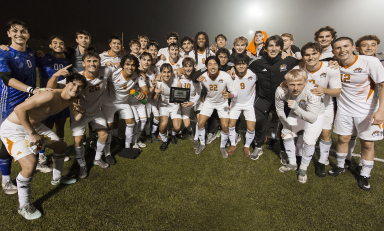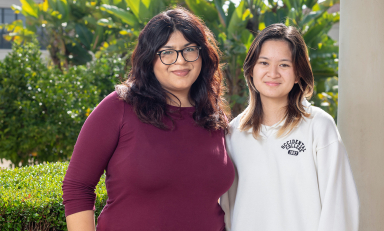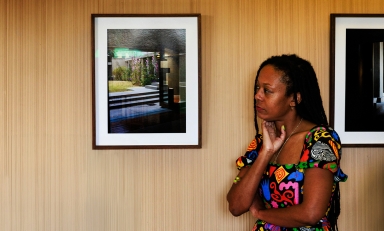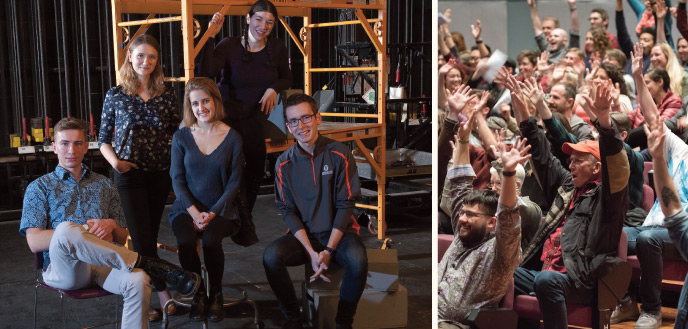
Five student playwrights—and dozens of alumni professionals—bring the party to Keck Theater for the platinum anniversary of Oxy’s New Play Festival
By Peter Gilstrap | Photos by Kevin Burke, Elena Sanchez ’18, and Marc Campos
When associate professor Laural Meade ’88 organized Oxy’s first New Play Festival in 1999—bringing working professionals in to work with student playwrights in staging their one-act plays—“my current students were either twinkles in their parents’ eyes or toddlers,” says the veteran playwright (whose current project, commissioned by the Mark Taper Forum, examines the war between capital and labor in Los Angeles at the turn of the 20th century).
For the festival’s 20th iteration February 23-25, five student plays were presented over three days—three by theater majors, and one apiece by philosophy and politics majors. “We’ll take a play from any student,” says Meade, who was assisted by theater department head Susan Gratch with play reading and selection. “It’s the classic liberal arts education, right? You’re a philosophy major. Why not write a play? It all goes into the mix of making you a better, more well-rounded person and someone who is able to more deeply relate and connect to other people.
“Twenty years feels like a milestone, and the festival is as old as our students now,” Meade adds. “I thought it’d be the year to highlight what we’ve been doing, and to say happy birthday to the festival.”
Adding an extra layer to the birthday cake: 20 “tiny plays” by 20 Oxy theater alumni, which were brought to life in whirlwind fashion by a troupe of student and alumni actors to close out the weekend.
From a rural family homestead and a glamping Utopia to stand-up comedy and childhood imagination games, this year’s student playwrights brought the new to the festival. What did they learn from the experience? In the words of Oxy junior Richard Via, who set his one-act in a funeral home closet, “Anything can happen in that world you create.”
Blue Sky State by Ari Nord ’18, directed by Alan Freeman ’66 M’67: Maya comes back to her rural family homestead to care for her aging mother. But she can no longer hide the real legacy of their land—from herself or her family. In the face of the truth, how can we balance personal and political responsibility?
“I actually just took the playwriting class last semester,” says Nord, a philosophy major from Billings, Mont. “When I was thinking about what to write, I was trying to stick to the old thing of, write what you know. I know Montana. There’s a tiny, tiny town that has all of the graves of my relatives going back to my great-great-grandfather who emigrated from Serbia, so it’s a big part of who I am.”
For Blue Sky State, Nord was paired with professor emeritus Freeman, “a wonderful person and a very thoughtful director,” she says. “At the beginning of the semester we would meet about the script and look at places that maybe needed rewriting or tweaking. Once auditions started, he was involved in that process and in the actual, hands-on directing: the staging, coaching the actors, and the artistic expression of it.”
“One of the things I always loved when I was teaching acting was when I had a senior non-acting major taking the course, because they would bring a fresh perspective,” says Freeman (who calls Blue Sky State “a really interesting, pretty solid play”). “It’s a perfect example of the liberal arts working really well within a serious artistic discipline, and Ari’s been a dream to work with.”
For Nord, the feeling is mutual. “We’ve been pretty eye-to-eye on most of it and he’s very conscientious and respectful of when I have an instinct on a reading, or maybe the staging, trying it out and if it works then it works. We usually agree!”
Nord’s studies in philosophy helped her “in creating the logic of fictional characters and their world, things that they know or don’t know,” she adds. “It really teaches you to be humble in thinking about your own ideas and beliefs, and being open to other ideas and beliefs that can change yours.”
As a first-time playwright, “I am not somebody who enjoys putting something of myself out there for other people to see and ponder, so that’s definitely been something that I’ve had to emotionally grapple with,” Nord says. Philosophically, she adds, “I think that’s a good thing in the long run—something to get more comfortable with.”
Out of the Woods by Kylie Brakeman ’18, directed by Alana Dietze ’07: Three female friends try to get off the grid and out of the grind in this farcical send-up of hipster escapism. Will their utopian glamping survive office interlopers, yurt ghosts, and the ultimate flower child?
When Brakeman was looking at colleges, “Originally, my goal was to go to school far away from home at an acting conservatory,” says the theater major from Pasadena. “But I didn’t get in anywhere and nobody wanted to give me any money.” Oxy turned out to be the right decision, she says, “because it allowed me the freedom to develop a more versatile set of skills and pursue a variety of academic interests. Also, everyone here is so smart and knows so much about the prison-industrial complex that I feel like I’m a better person just through osmosis.”
Having been involved in theater dating back to middle school, “mostly in an acting and improv capacity,” Brakeman saw the New Play Festival as “a really great way to challenge myself to develop a long-form narrative piece,” she adds. “I’m used to writing sketch comedy, which is short and less personal, so I wanted to force myself to create characters that were real people and served a real purpose beyond a three- or four-page joke.
Returning to the idea of “Write what you know,” she says, “I hung out with a lot of hot girls in high school, so a lot of the inspiration for Out of the Woods comes from attempting to apply hot-girl logic and hot-girl philosophy onto your own, slightly less hot-girl life, to no avail.”
Several years ago, Brakeman wrote another play, Waiting to Burn, in which a woman gets into the wrong afterlife by mistake—“essentially the same concept as NBC’s ‘The Good Place,’” she says. “Out of the Woods is the first play I’ve had read aloud by human people.”
Working with Dietze, who made her stage debut as a fairy in an elementary school production of A Midsummer Night’s Dream, “I knew I was in good hands,” Brakeman says. “Alana was so calm, cool, and collected throughout the process.”
Outside of Keck Theater, Brakeman performs improv with CSz LA’s Sunday company, and her web series “Blondes Bless America,” a parody of Fox News’ Tomi Lahren’s commentaries, can be found on YouTube. After graduating this spring, she says, “you can catch me waiting tables, stalking acting agents, and taking Upright Citizens Brigade classes.”
Tom Flackford’s Death Party by Richard Via ’19, directed by Kaja Martin ’08: Can a small coat closet at the local funeral home contain a huge love triangle? Michelle loves her husband Mark who loves their friend Phillip. And who cares if someone’s dead? No one’s going to let mourning (or singing a killer eulogy song) get in the way of their final showdown.
“The best way to describe this entire thing has been like a whirlwind,” says Via, a theater major from Round Lake Beach, Ill. “You do so much as a playwright in these three weeks that I didn’t anticipate in the slightest.” And working with Martin and actress Karen Baughn ’08, “they gave me things that I didn’t even know could happen. Like Karen’s improvs. I’m just like, ‘You’re a genius! I want you to do everything I’ve ever written!’”
Tom Flackford’s Death Party began in a very different place. “When I started I had 40 pages of a very dramatic piece. It was two characters named Mark and Phillip who fell in love. It was this whole annoying love story, and then Laural was like, ‘This isn’t you—this is like, corny and disgusting.’ I was like, ‘You know, I agree with that.’”
Via threw out that first draft and, over the next seven days, wrote 50 pages about three people—Michelle, Mark, and Phillip—trapped in a funeral home closet. “This is the most self-aggrandizing play I think anyone could have ever written,” he says. “It gives me a genuine chuckle, and watching people react positively to it is a lot of fun.”
The first-time playwright may pen another piece for his senior comprehensive. “There’s something academic about writing a play,” says Via, who plans to focus on “the performance aspect of theater” after graduation. “There’s definitely a formula—exposition, conflict, all the characters have to want something—which I really respect. But the parameters are loose enough where I can make the characters do whatever they want.”
Tragedy + Time by Greg Feiner ’18, directed by Winston A. Marshall ’10: Two standup comics have too much serious business in their lives to take on the lighthearted nature of love. But maybe a few laughs together are just what their separate tragedies need.
For a politics major, Feiner has studied a whole lot of theater at Oxy. “I’ve taken 12 theater classes, including two performance labs, for 32 total units,” says the La Jolla resident. He also spent a semester in London studying at the Fordham London Centre’s London Dramatic Academy, “which was 16 additional units,” he notes. “Even so, I’m just a theater minor.”
Tragedy + Time is Feiner’s second play—his first, a romantic comedy about suicide titled Unrealistic Expectations, was part of the Oxy new play development workshop his sophomore year, and he produced a revised version of it with some of his Oxy theater friends in the Hollywood Fringe Festival last year.
The title of his new play, of course, comes from the old axiom about comedy. “I’m big into standup, and if there’s one constant I can trace across every truly funny person I can think of, it’s that there’s something inside them that’s deeply broken,” he explains. “That brokenness is where the laughter comes from. It’s not just a party trick, it’s a survival tactic—a light in the darkness.
“But the other side of that coin is the humor also distances you emotionally so you don’t get more hurt than you already are, and that can prevent positive connection as well as negative. I kind of wanted to explore two funny, lonely people in love trying to say something serious before it’s too late.”
Helping realize Feiner’s vision was his director, whom Feiner fondly calls “Amar.” “Winston Alex Marshall is the coolest human being on the face of planet Earth,” he says. “He just got exactly where I was going and brought a ton of phenomenal ideas into the rehearsal room—a lot of which made it into the final script. Honestly, I really lucked out.”
Play Pretend by Eliana Sternin ’19, directed by Emma Zakes Green ’09: Three little girls become three young women in this exploration of self, sexuality, and honesty through the lens of games: make-believe, drinking games, and role play. But when the lines blur, it’s impossible to know where the fun stops and real life begins.
“Play Pretend is based on my relationship with my younger sister and our mutual friend,” says Sternin, a theater major from Van Nuys. “We all grew up playing imagination games, and that prompted a moment of reflection of like, wow, we have all come so far, what has that journey looked like for us?”
Having written plays and shorts “since I was pretty young,” Sternin chose Oxy because of its size. “I’ve always felt I flourish better in smaller departments, because the learning is more personalized, and that definitely appealed to me about the Oxy theater department. Classes were small enough to where the professors know your journey so they can evolve their strategies for helping you as you move along.”
As one might expect, Sternin found her festival experience to be both stressful and rewarding. “Having to really focus and seriously edit your play because you have a very strict deadline, I think that’s been the most useful thing,” she says.
“You have not just the dramaturge [playwright Sarah Mantell, the 2018 Edgerton Guest Artist in Residence] and the producer [Meade] giving you notes, but you’re working with an outside director who has their own interpretation,” she adds. “Hearing from all these different sources really allows you to get an understanding of how people are reading your work, and then you can continue clarifying and evolving it as need be.”
Collaborating with director Green, who works in the L.A. theater scene, was a major plus for Sternin, who plans to pursue a career in acting or singing. “It’s wonderful to have someone taking you seriously as if you were a professional, and getting to hear all the components that go into what you have to think about as the director of a brand-new work that’s still changing and growing.”
Peter Gilstrap wrote “Occidental Fanfare” in the Winter magazine.

